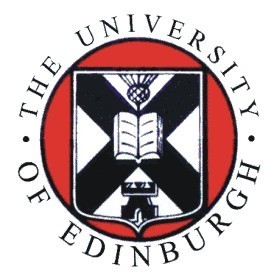The University of Edinburgh and Biffa are using their influence to help Scotl...
The University of Edinburgh and Biffa are using their influence to help Scotland deliver its Zero Waste agenda. Staff and students are working with waste and recycling partner Biffa to reduce, re-use and recycle.
Through relationships built across departments and with the local community sector, the University is well on its way to a resource-efficient and sustainable future. David Brook, University of Edinburgh’s Support Services Operations Manager said: “We had a complete rethink about how resources are managed across the University of Edinburgh. Our waste policy encourages the sustainable management of resources, and with the right partners in place we are well on the way to achieving our goals.”
Striving to set an example to other large organisations in Scotland, the University is taken a number of radical approaches to delivering a circular economy and keeping materials ‘in the loop’.
Involving everyone in the journey to Zero Waste
Engaging over 46,000 staff and students in 550 buildings across the city, the University is innovating and drawing on the expertise of staff and students to achieve exemplar status as a zero waste university.
“We had to work hard to convince people, but with backing from the Vice Chancellor and the Zero Waste Scotland regulations, we were able to show that it was a good idea,” said Sophie Rippinger, Waste Contracts Officer, University of Edinburgh, “Now, two years on, perceptions have totally changed and we have overwhelming support for the new system.”
What happens to the University of Edinburgh’s unavoidable waste?
A number of departments have also worked together to produce a report, Circular Economy Thinking in Action, which sets out priorities for the University’s future.
The University of Edinburgh is now sending zero non-hazardous waste to landfill
Fleur Ruckley, Waste and Environment Manager at the University of Edinburgh said: “Biffa supplies us with information on the contents of each and every bin so we can see how our waste is changing over time. With data on the materials collected at each location, we can quickly deal with any contamination issues.”
The University’s awareness raising website, www.ed.ac.uk/recycling and mobile-friendly A-Z recycle.ac, carry information on the recyclability of different wastes and they’ve also produced a video to raise awareness of the contamination issue.
“We very much try to stay at the forefront of how resource management is changing in Scotland,” said Sophie Rippinger. “In essence, we are working with Biffa to nurture the new generation of professionals who will deliver the Zero Waste Scotland agenda.”
Extending the benefits to the wider community
Biffa has also helped the University join up with Yooz and MARC, members of Community Resources Network Scotland, to re-use materials including rubber floor tiles and furniture.
“Following the waste hierarchy is absolutely core to Biffa’s service delivery approach, and teaming up with the community sector importantly means the value of resources can be kept in the local economy,” said John Gilmour, Biffa Commercial Manager (Scotland and Northern Ireland).
A case study on Biffa and their work with delivering circular economy project with the Higher Education Sector, and the University of Edinburgh in particular, can be downloaded below.
Photographs from the students’ visit to Biffa’s materials recovery facility in Broxburn are available to view here.
Through relationships built across departments and with the local community sector, the University is well on its way to a resource-efficient and sustainable future. David Brook, University of Edinburgh’s Support Services Operations Manager said: “We had a complete rethink about how resources are managed across the University of Edinburgh. Our waste policy encourages the sustainable management of resources, and with the right partners in place we are well on the way to achieving our goals.”
Striving to set an example to other large organisations in Scotland, the University is taken a number of radical approaches to delivering a circular economy and keeping materials ‘in the loop’.
Involving everyone in the journey to Zero Waste
Engaging over 46,000 staff and students in 550 buildings across the city, the University is innovating and drawing on the expertise of staff and students to achieve exemplar status as a zero waste university.
“We had to work hard to convince people, but with backing from the Vice Chancellor and the Zero Waste Scotland regulations, we were able to show that it was a good idea,” said Sophie Rippinger, Waste Contracts Officer, University of Edinburgh, “Now, two years on, perceptions have totally changed and we have overwhelming support for the new system.”
What happens to the University of Edinburgh’s unavoidable waste?
- Food waste is separately collected in every cafe and the linked kitchens, and is treated via anaerobic digestion to generate clean, green renewable energy.
- Source-separated glass, paper and card are recycled into new products.
- Metals, plastics and dry mixed recycling are sorted at Biffa’s materials recovery facility in Broxburn and then recycled into new products.
- General waste that can’t be recycled is converted into a fuel and used to generate electricity.
A number of departments have also worked together to produce a report, Circular Economy Thinking in Action, which sets out priorities for the University’s future.
The University of Edinburgh is now sending zero non-hazardous waste to landfill
Fleur Ruckley, Waste and Environment Manager at the University of Edinburgh said: “Biffa supplies us with information on the contents of each and every bin so we can see how our waste is changing over time. With data on the materials collected at each location, we can quickly deal with any contamination issues.”
The University’s awareness raising website, www.ed.ac.uk/recycling and mobile-friendly A-Z recycle.ac, carry information on the recyclability of different wastes and they’ve also produced a video to raise awareness of the contamination issue.
“We very much try to stay at the forefront of how resource management is changing in Scotland,” said Sophie Rippinger. “In essence, we are working with Biffa to nurture the new generation of professionals who will deliver the Zero Waste Scotland agenda.”
Extending the benefits to the wider community
Biffa has also helped the University join up with Yooz and MARC, members of Community Resources Network Scotland, to re-use materials including rubber floor tiles and furniture.
“Following the waste hierarchy is absolutely core to Biffa’s service delivery approach, and teaming up with the community sector importantly means the value of resources can be kept in the local economy,” said John Gilmour, Biffa Commercial Manager (Scotland and Northern Ireland).
A case study on Biffa and their work with delivering circular economy project with the Higher Education Sector, and the University of Edinburgh in particular, can be downloaded below.
Photographs from the students’ visit to Biffa’s materials recovery facility in Broxburn are available to view here.












